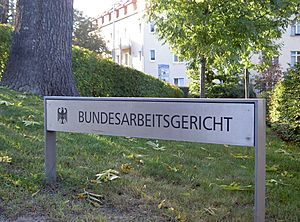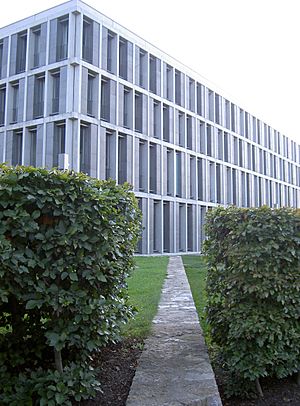Bundesarbeitsgericht facts for kids
The Bundesarbeitsgericht, also known as the Federal Labour Court, is a very important court in Germany. It is the highest court in Germany for cases about labour law. Labour law is all about the rules for people who work and their employers.
This court handles two main types of cases. One type is about "individual" labour law. This means it deals with problems between one worker and their boss. For example, it might be about a worker's contract or if they were fired unfairly.
The other type is "collective" labour law. This involves groups of workers or unions. For instance, the court might hear cases about strikes or agreements between unions and companies. These agreements are called "collective bargaining."
What the Court Does
The Federal Labour Court makes sure that labour laws are followed correctly. It helps solve big disagreements about work. This court is like the final referee for work-related legal issues in Germany.
How Cases Reach the Court
Cases usually start in smaller courts called Arbeitsgerichte. These are like local labour courts. If someone doesn't agree with the decision there, they can appeal. Their case then goes to the Landesarbeitsgerichte. These are higher state labour courts.
If there is still a disagreement, the case can go to the Bundesarbeitsgericht. This court only hears appeals from the Landesarbeitsgerichte. It makes the final decision on many important labour law cases.
Where to Find the Court
The Bundesarbeitsgericht is located in the city of Erfurt. Erfurt is a city in central Germany.
Images for kids
-
The building of the Federal Labor Court in Erfurt
 | Leon Lynch |
 | Milton P. Webster |
 | Ferdinand Smith |




